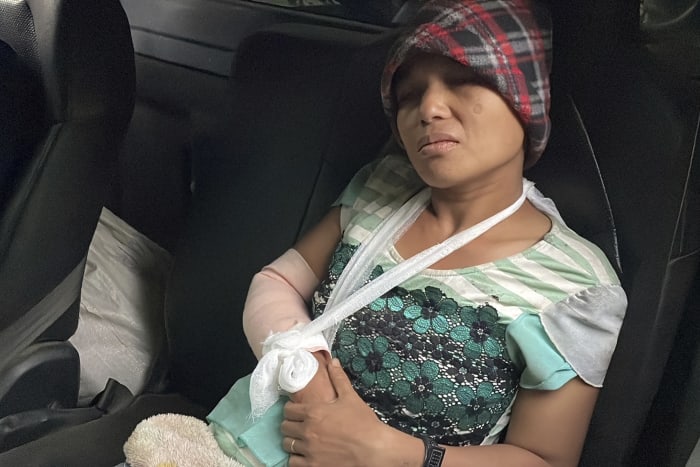Myanmar arms industry grows after military takeover

Bangkok – Companies in at least 13 countries have helped Myanmar build capacity to produce the weapons being used to commit atrocities following the 2021 military takeover, independent international experts say. discovered.
A report released on Monday by the Myanmar Special Advisory Committee details how the country has ramped up its arms production since the military took power on 1 February 2021, with large-scale It is igniting a public opposition movement.
The military takeover from an elected civilian leader has reversed almost a decade of progress towards democratization after 50 years of military rule. Those opposing the military government took up arms after security forces used deadly force against peaceful demonstrators.
The Political Prisoners Assistance Association has documented the deaths of more than 2,700 civilians, including 277 children, in the violence, and over 13,000 people have been detained. The real number is believed to be higher.
Companies in the United States, Europe, Asia and the Middle East support military supply chains, the report said, urging these companies to make sure they are not contributing to human rights abuses.
The growth of the domestic arms industry is due to some countries implementing arms embargoes and sanctions against individuals and companies involved in the arms trade and production.
In October, the U.S. Treasury Department imposed sanctions on Aung Moe Myint, a businessman close to the army who said he facilitated arms deals for the military. His brother, his Hlaing Moe Myint, and the trading company they founded, Dynasty International Company Ltd., were also targeted. His Myo Thitsar, one of his directors, was also sanctioned.
In November, the United States imposed sanctions on an aircraft supplier to the military for deadly airstrikes on civilians.
Such companies are run by the Ministry of Defense and the Directorate General of Defense Industries, the report said, as there are no civilian arms manufacturers in Myanmar.
Local factories can take advantage of licensed technology and overseas supply chains, technical support and other assistance, and may even send equipment to Singapore and Taiwan for upgrades and maintenance, it said. .
Council expert Chris Sidoti said in a statement that it was investigating companies that would allow the Myanmar military to manufacture weapons used in “indiscriminate attacks on civilians” and for good reason. He urged governments to take action, if any.
“Foreign companies profiting from the suffering of the people of Myanmar must be held accountable,” said Sidoti, a human rights lawyer and member of the United Nations Fact-Finding Mission on Myanmar from 2017 to 2019.
A report last year by the United Nations High Commissioner for Human Rights named companies from Russia, China, Ukraine, Israel, Singapore and the Philippines, outlining some of those connections.
A major factor driving the growth of the domestic arms manufacturing industry is the risk that imports of arms, military aircraft, and other weapons will be blocked by embargoes or sanctions. The Army is now self-sufficient in manufacturing small arms, according to reports.
Myanmar’s weapons manufacturing capabilities include a range of items from assault rifles and machine guns to mortars, anti-tank and anti-aircraft weapons, missiles and missile launchers, artillery and air defense systems, it said.
Landmines and sea mines are among other products being manufactured in Myanmar, the report said, citing people who worked in the industry and those displayed at a defense and security exhibition in Bangkok that displayed such products. He also quotes photos of the weapons he used.
The weapons factory, known as “KaPaSa”, an acronym for the local name of the Directorate General of Defense Industries, utilizes components such as fuzes, sights and detonating caps imported from India and China. It also has a computer numerical control (CNC). Machines for milling, grinding and other functions made in Austria, Germany, Japan, Taiwan and the United States, the report said.
The exact number of such factories is unknown, but analysis of satellite imagery and other information confirms that there are dozens of such facilities.
Before the military took control, much of the technology used in the weapons manufacturing industry was transferred to civilian use, and the democratically elected government of Aung San Suu Kyi was ousted.
But the complex network of suppliers, technology licensors and other arms-making details require further investigation, the report said.
Myanmar has endured decades of armed conflict between the central government and ethnic minorities seeking greater autonomy, mostly in border areas.
___
For more information on AP’s Asia Pacific coverage, please visit: https://apnews.com/hub/asia-pacific
Copyright 2023 The Associated Press. All rights reserved. This material may not be published, broadcast, rewritten or redistributed without permission.
https://www.local10.com/news/world/2023/01/16/report-myanmar-arms-industry-growing-after-army-takeover/ Myanmar arms industry grows after military takeover



